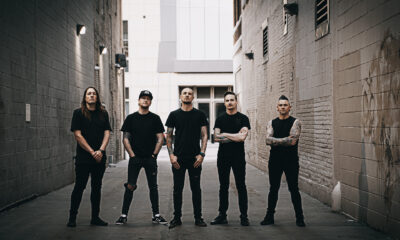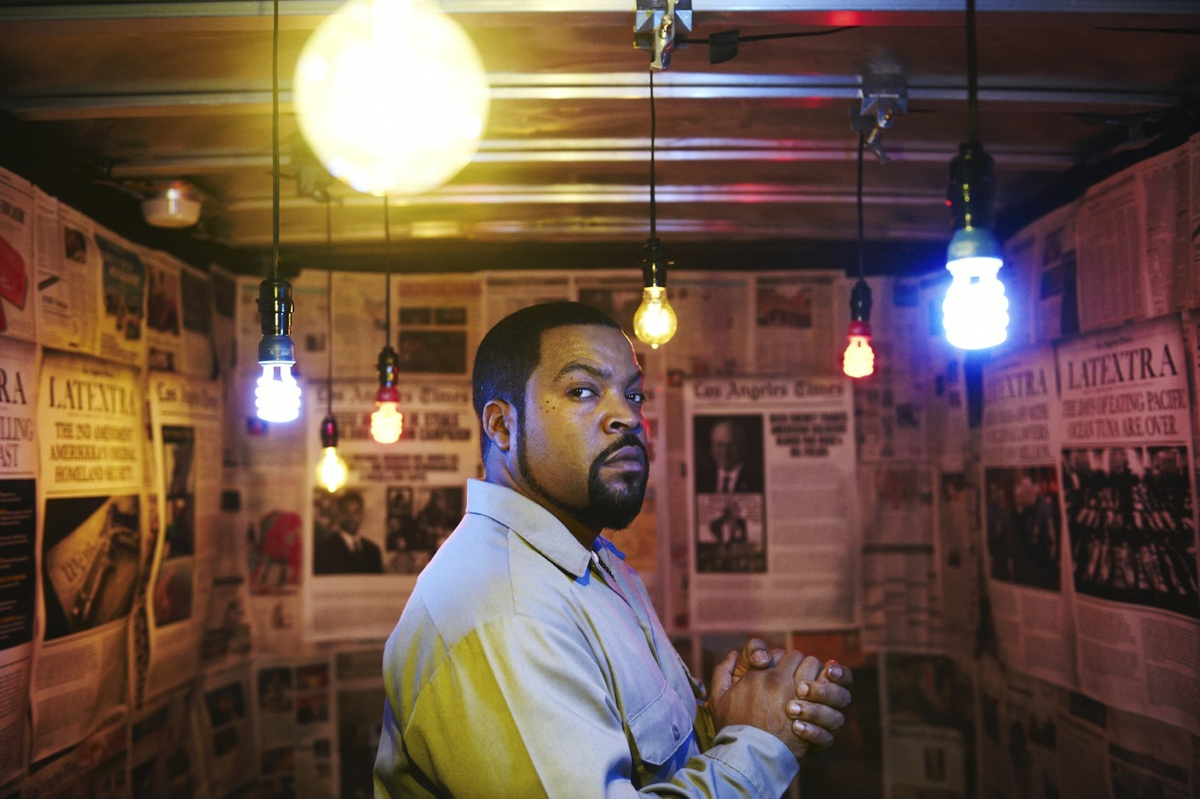Interviews
Interview with Arkaea lead guitarist Christian Olde Wolbers
The latest heavy metal supergroup is none other than Arkaea. Made up of members of the very popular Fear Factory and Threat Signal, Arkaea is a brand new band that mends the remarkable talents of lead guitarist Christian Olde Wolbers and singer Jon Howard. Add in Raymond Herrera of Fear Factory and bassist Pat Kavanagh of Threat Signal…

The latest heavy metal supergroup is none other than Arkaea. Made up of members of the very popular Fear Factory and Threat Signal, Arkaea is a brand new band that mends the remarkable talents of lead guitarist Christian Olde Wolbers and singer Jon Howard. Add in Raymond Herrera of Fear Factory and bassist Pat Kavanagh of Threat Signal and you have quite a formidable presence in today’s metal scene. The band has been brewing now for a few years but now things are finally set for Arkaea to make their presence felt in today’s music scene. The group’s debut album Years in the Darkness is set for release July 14th and judging by some samples on the band’s website, it should prove to be pleasing to any fan of Fear Factory, Threat Signal or hard metal for that matter. Currently the band is looking to get on some tours with some other metal bands to get the word out about Arkaea and their new record. Recently I was fortunate enough to speak at length with Christian of the band about Arkaea, what the group is all about and what it was like making and producing Years in the Darkness.
Arkaea is a new band, having formed only in 2008 and featuring members of Fear Factory and Threat Signal. How exactly did the band come together?
Christian: Well we actually started around 2006, Raymond and I were writing early that year for the next Fear Factory record and as soon as it felt like we weren’t going to do another record anytime soon, we took most of the songs that we had been writing and assigned those to a different project. I knew that I wanted to do something different and of course I said to Raymond, let’s do something else, we don’t have any other side projects or anything going on right now, let’s just start writing for something new, something fresh. Then John came in, did some songs and that’s kind of how it started, around March of 2006.
How did you come up with the name Arkaea? What’s the story or meaning behind the name?
Christian: Well actually the real meaning behind it is, the word is spelled a lot different, it’s spelled archea which is actually a bacteria that started in the ocean, like a fungus bacteria and it was also very common in a lot of tropical trees and it also has a meaning of being a Greek God. We took the letters, we thought it read well, but we took some of the letters and changed it, so we made it Arkea and at that point it doesn’t really mean anything, we just kind of bastardized the word you know and I kind of like that because when people ask me oh well what does it mean, well it means the band, our entity, our music. So when you go on Google and type in arkaea, it’s not some weird cult following or whatever comes up, the band comes up. That’s one thing I’ve always hated about a lot of bands, I mean if you type in a band name like Death, that was a tough one, I remember I was doing a search the other day for some YouTube videos on Death and I had to like really like put “Death, the death metal band from Florida” you know, I had to really put in the details. When you just type in Death, a million other things come up. That’s one thing I really liked about our name, that once you type it in, it’s just Arkaea, people will know it’s Arkaea the band, it made it really simple so that’s really one thing I liked about that.
Also, Arkaea, Pantera, Metallica, it has those syllables, with the two As and the middle syllable you know, that rings really well. Some people don’t know how to read it but it’s actually an easy word… And it doesn’t sound too metal, you know, that’s another thing I really liked about it. It’s always tough to find that name, you know… we could sound like Nickelback, I like it when people kind of have to be a little suspicious.
What would you say is the main difference between a Fear Factory or a Threat Signal album and an Arkaea album?
Christian: Well there is a big difference between them all, even though we still write the way we do for Fear Factory or Arkaea, we still write the same way. The good thing is that once John came in and started singing over some tracks, even if I wrote it as designed for Fear Factory, I would automatically change it because you know, his vocals don’t fit the same way like a different vocal would. Actually some of the songs that we already had kind of prepared, once John started doing vocals, we started changing the songs, I started changing some of the riffs, some of the riffs, I mean it was working but it was not really magical. So I had to go find other parts and bits of riffs that fit his vocals better and because of that, a lot of the riffs were a lot more open and strummy sounding like a Deftones or Foo Fighters type of chord. We wanted the record to be really, really heavy but once John started putting vocals on top of it, it was just generic. I could play three chords that have a good string to it kind of a la Deftones and John would sing a great big melody hook over it and I’m like “wow that’s a great part, that sounds like a song already.” I’m like “do I have to play like simple chords and you know simple structures?” No I can’t do that, I got to keep it somewhere intense and heavy and riffy so I had to find a good balance which was in the beginning, I wouldn’t say was tough, but it was like “oh wow, I got to change my style.” I kind of looked at it as I have the opportunity to open up and change and go outside of my box because this is not Fear Factory which is cool.
So when we were writing in the beginning and I would start strumming something really melodic, for Fear Factory that wouldn’t really work all the time. But since it’s Arkaea which is a different band, I can really do whatever I want. Whenever a vocal really became magical on top of one of the riffs, that was a keeper, that’s kind of how I looked at it. But I’m not afraid to write fifty songs and have John do fifty vocals and fifty songs and then “no, no no, wow this fits…” you know what I mean? I’m not afraid to work like that, a lot of people don’t like to work like that, especially veteran bands. Bands like Linkin Park wrote like a hundred songs for their last album and then they picked the twelve best. That is a lot of work and a lot of will power. That’s something I really miss about bands these days, you can tell when they write records, they might have one or two more extra songs and that’s it, they don’t write thirty, forty, fifty songs anymore and pick the twelve best ones like bands used to do.
What’s going on with Fear Factory these days? Do you have any future plans for that band?
Christian: Um, yeah Raymond and I always have plans for the band, touring, working and making records. We have a legal standstill right now, trying to figure things out, so, you know, that’s the situation right now. Once it’s cleared up, we’ll see what happens. It’s a bunch of bullshit, I’ll tell you that much, I don’t really need this bullshit, I came here to fucking play music, not be involved in a bunch of bullshit. It’s like a soap opera man, if I want to watch a soap opera, I’ll watch TV.
Let’s talk a bit about your debut album Years in the Darkness which is due to come out later this summer. Now that it’s just about out there, how do you feel about how the album has turned out?
Christian: I’m really pleased… this is probably the first record in my career that I’ve completed that I feel really proud of. It’s also because I was involved with the most part of the writing, but for me, to go start a new band away from Fear Factory with Raymond and John, it’s like a new beginning, it’s like a new group, and it’s like starting from zero. There are a lot of expectations on Raymond and I, we worked on it for almost a good two and a half years and we worked hard on it. It’s fourteen songs and I mean, even though the record is done, I still hear things that we could have done better or improved, but I mean for a debut record it’s pretty solid. For the people we’ve played in for in the music industry or for friends that address their opinions, most people come back like “wow, solid, good introduction.” So I’ve been getting really good feedback and you know, we just worked really really hard on it and we wanted to make a really solid record, from the album cover to the last song on the record. The album cover is just phenomenal, it’s just epic and like when you look at it, it kind of looks like a movie and then with the music and everything, it just all ties in. I think we succeeded pretty well in getting a good debut album together that’s just rock solid, front to back. It’s got a little bit of everything, it’s got heavier stuff, there are a couple of songs that are way more melodic, the last song on the record is an acoustic, outro piece, it’s a song but it’s more like an outro piece to the album that John wrote that’s really cool. The record does take you for a little bit of a rollercoaster ride, it’s not all the same, there’s definitely some different stuff on it.
We already got ideas for the next one so with this first album, I can really go in and be like “oh wow, that really worked, that song really worked, some of the techniques we used on this song, that really worked, we could use that for the rest record.” We can look back on this record and like pick out little things that are becoming like a stamp, a trademark stamp in the Arkaea entity. There is still a little bit of Fear Factory of course because of Raymond and I and that’s something the fans will definitely expect so um, even if we tried to change that, it would be hard. Even if we would try to play not like the way we write, it’s always going to sound a little Fear Factory-ish, I mean it’s normal, it’s Raymond and I, we were half of Fear Factory for, for me, sixteen years, for him it’s nineteen years. But I’m really really happy with the record and right now we’re going to be looking for tours, we’re looking for some bands out there to be able to pick us up and be like “oh wow, this is a brilliant record, let’s have these guys open for us.” That’s probably the thing we’re going to be doing first is a lot of support slots hopefully.
I read that originally Years in the Darkness was going to be released back in March. Is this true and if so, what was the reason for its delay?
Christian: Yeah that was our first goal, to get the record released in March but then, Terry Date mixed the record and he needed a little more time, he was also busy. There were another couple of factors, we wanted to have a three to four month set-up time to get the press involved and to get the awareness about it, there were a lot of little things and it made more sense to keep pushing it back to you know, make the release a solid release rather than just kind of push it out the door real quick and no one would have known about it. There were probably twenty, thirty, forty people working on this release, so to get everyone on the same page, it takes a little while, it was a lot better for us to release it in July.
Instead of finding a producer, you yourself took care of production on Years in the Darkness. Why did you decide to do it yourself and what was this experience like for you?
Christian: Well you know, not to sound egoistic, but I came up with the idea to start the band and then Raymond and I started doing all of the groundwork of the band, at that point we were already producing the record ourselves kind of. Since I’ve been producing a lot of bands lately, it was just easier to just do it in the same old fashion that I’ve done it with every other band and just build it from the ground up. Jeremy Blair helped us out with all of the demo stuff to get everything in place and I mean, it’d be weird to put it in another producer’s hands unless it’s like Terry Date, someone I really respect or you know someone who could take the band in a certain direction that I would be like “wow that’s magical.” But there isn’t too many people like that that I could really trust, there’s only a few, there might be a couple of other producers I could find that I want to work with but my favourite has always been Terry Date, I’ve met him a couple of times through Limp Bizkit and Deftones when he was working on those records. He finally came on board and he’s actually someone I’ve been wanting to work with even in the Fear Factory days, every record I was pretty much involved in. Finally he gave in and was like “okay let’s do it.”
Terry is amazing though, but it just made more sense for me to do it myself and then once Terry came onboard, I was really happy to just turn everything over to him and let him work his magic. I mean just his track listing is phenomenal you know what I mean, Slipknot, Pantera, Soundgarden, Incubus, Staind, Korn, Smashing Pumpkins, even Nine Inch Nails, the list keeps going. Next record I think he’s going to be doing the whole thing, we’ve been talking about it, he’s going to kind of be our fifth member, kind of like how he is for Deftones, I like to keep it in the same family, if it’s not broken, don’t fix it. And he actually said he’d like to come in next time and record the drums as well and stuff. I already know the next record is going blow away the first one, I can already tell, which is good because that’s the way it’s supposed to be, there’s suppose to be a growth in the band. Just like Deftones, their first record was a little more stale sounding, more metal-ish but then their second record, you could tell the level of production had improved, the band was growing, I’d like to get that same transition from record to record going kind of like how they did it with Terry, he’s just an amazing producer.
What was the writing and recording process like for the record? Did you all write together in the studio or did you bring in individual songs or ideas? I read that you said half of the thirteen songs on the album were originally suppose to appear on the next Fear Factory album.
Christian: Yeah, we released bits and pieces of it at that point because I took a lot of stuff out, after John came in and did vocals like you know, the song was a good song but the chorus was just like uhhh. Even if it was a Fear Factory style song, it didn’t mean that John was going to work with it, um, we wrote for a different singer so now with John coming aboard and his style being different, some of the parts really didn’t fit him so we thought we better write a different type of chorus or something else where he can be him on that part rather than trying to sing, I’m not trying to say sing like Fear Factory… If it didn’t work, I was not trying to force it. If I had to change a song drastically for John to be able to make a good song out of it, that’s what you got to do. Making records to me is about vocals, because I hear a million heavy bands and they all sound great, phenomenal guitar players with a lot of skill and a great drummer and all this, I can name a hundred bands like that. But as soon as you start hearing the singer you’re like “oh, turn this off.” In this day and age, we recognize a good band by the singer you know, not really by playing skills.
I think only Meshuggah can get away with it, but their singer has become a lot better over the years. Earlier Meshuggah records, I never really liked the vocals, but I loved the band. And actually this last Meshuggah record, it’s actually the first record that I really liked by them, the vocals actually fit the intensity of the band now, it’s coming together. It took a long time for them, the vocals use to be like, you know they kind of don’t go anywhere, it’s just the same thing every time, but at this point it kind of seemed to work, with that last record. That’s kind of like a little bit of an example that band is just phenomenal, but I always felt they could do a little more with the vocals, but that’s their style, that’s the way they do it I guess. If they were to have a Randy from Lamb of God you know what I mean, with that attitude and that charisma that he has, I think that’s something Meshuggah needed a long time ago.
But European bands usually don’t have that much charisma; you know American metal bands usually have a little more charisma. In Europe it’s different, there’s a different mentality out there. There’s a lot of great bands, but it’s really about the vocals. I can sit here and listen to a song starting off and be like “oh fuck, that sounds really good” and then the vocals come in and it’s like someone pulled the break in a car, it’s like what the fuck? It just ruins everything. That’s something I really like about John, he’s just a good singer, he’s always so melodic and he has a lot of range, kind of like a Chris Cornell or a Chester from Linkin Park, all those singers have a higher range, they’re really up there. Most singers in metal have that mid-tone vocal and it becomes kind of stale, but John really has that extra range. Singers like that, usually you can get more melody on a record, I’ve always noticed, that’s what I really like about John, he has range and lung power for such a little guy.
Do you have any plans to tour behind the album? If so, could you let us in on your tour plans?
Christian: Well we’re waiting for Metallica and all those other big metal bands to call us to take us on tour. [laughs] At this point, it’s kind of just promoting the record, putting the record out and kind of sit here as sitting ducks a little bit to see what’s going to fall in place in terms of touring. It’s easy, usually we just book a tour and we go on tour and we play for packed housed but with a new band it’s a little different. So once people start getting into the band a little bit and what we’re doing and what it sounds like, we’re going to try to hopefully get out and do some touring. We’re ready to go work this record just like any other album. So it’s going to take a little bit of time I think, there’s a lot of bands out in Europe doing festivals over the summer so we might not be able to find something until the early fall.
Yeah I mean you want to get on a good tour…
Christian:Yeah, I mean I like Behemoth, but I don’t think it would fit you know, it’s not really going to do anything for us… Now I’m going to start dreaming, I wish we were on a Nine Inch Nails tour or something like that. [laughs] Keep dreaming, it’s nice to dream.
What are your long-term plans for Arkaea? Do you see this going on for several albums?
Christian: Yeah, making records, we got a three record deal so there’s going to be at least three. We definitely have plans to get this band in gear and see how far we can take this. You never know, it could be the worst disaster or it could be the best thing since sliced bread. You never know, it’s a little bit of a gamble but as long as we feel strongly about the record and we know that we made a good album, I mean usually that’s a big plus. I can’t really fool myself, I mean the last Fear Factory album was definitely not an album that was up to par and you know, we had eighteen songs and only eight were finished. There was a lot of bullshit going on with that record, but you know that was definitely a record I was not proud of and was actually embarrassed of. But you know I definitely made sure not to do that with this record.
It takes four people to make a record to be on the same page, everyone’s hungry, I played on a professional soccer team and I know what it takes, I know what team work is. I played professionally when I was younger, before I was in Fear Factory and I just started playing professional again for a team here in Los Angeles. It takes a whole team; we got like five wins and one loss only this year, our first year of professional. It takes team work to win a game and the same thing in music; it takes team work to make a great album. If one person is not up to par, it’s not going to work. You can’t fool the kids, when a kid puts on a record in their bedroom, they can tell if you’re passionate about that record or not. You can’t really fake it, as an outside listener you can tell even more than if you’re in the band. [ END ]
-

 Alternative/Rock6 days ago
Alternative/Rock6 days agoTom Walker Puts on Spellbinding Performance at Leeds O2 Academy
-

 Alternative/Rock2 weeks ago
Alternative/Rock2 weeks agoThe Warning Shake the Foundations of a Sold-Out Leeds Stylus [Photos]
-

 Alternative/Rock6 days ago
Alternative/Rock6 days agoThe Cruel Knives Headline Top Night of British Rock at Manchester’s The Lodge [Photos]
-

 Hip-Hop/Rap2 days ago
Hip-Hop/Rap2 days agoFormz: “I was always the confident kid in school, with a passion for entertaining and being the centre of attention..”
-

 Alternative/Rock5 days ago
Alternative/Rock5 days agoThe V13 Fix #012 w/ Dååth, Unearthly Rites, maybeshewill and more
-

 Alternative/Rock2 weeks ago
Alternative/Rock2 weeks agoThe V13 Fix #011 w/ Microwave, Full Of Hell, Cold Years and more
-

 Indie2 weeks ago
Indie2 weeks agoDeadset Premiere Music Video for Addiction-Inspired “Heavy Eyes” Single
-

 Interviews3 days ago
Interviews3 days agoKill The Lights Michael ‘Moose’ Thomas Talks Success, International Bandmates and more




